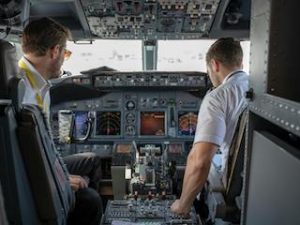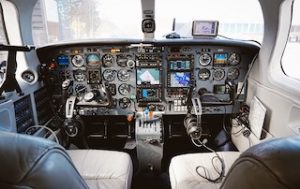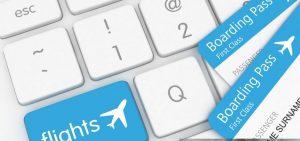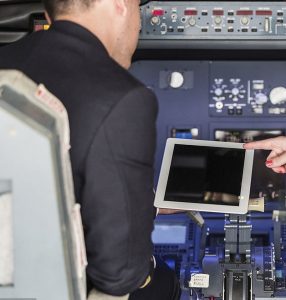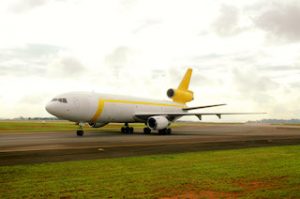Psychometric Testing In Pilot Selection
 In the realm of aviation, the selection process for aspiring pilots is as rigorous as it is comprehensive. This process is designed to ensure that only those candidates who possess the right combination of skills, knowledge, and psychological attributes are selected to take on the demanding role of a commercial airline pilot. Among the various phases of this process, psychometric testing stands out as a critical component. Unlike technical evaluations that assess a candidate’s flying abilities, psychometric testing delves into the psychological traits, cognitive abilities, and personality characteristics that are essential for a successful career in aviation.
In the realm of aviation, the selection process for aspiring pilots is as rigorous as it is comprehensive. This process is designed to ensure that only those candidates who possess the right combination of skills, knowledge, and psychological attributes are selected to take on the demanding role of a commercial airline pilot. Among the various phases of this process, psychometric testing stands out as a critical component. Unlike technical evaluations that assess a candidate’s flying abilities, psychometric testing delves into the psychological traits, cognitive abilities, and personality characteristics that are essential for a successful career in aviation.
The importance of psychometric testing in pilot selection cannot be overstated. This phase is designed to evaluate whether a candidate has the mental and emotional qualities necessary to handle the pressures and responsibilities of flying. Given the high stakes involved in aviation, where the safety of passengers and crew depends on the pilot’s ability to make sound decisions under pressure, psychometric testing provides airlines with valuable insights into a candidate’s suitability for the role.
Cognitive abilities: The foundation of effective decision-making
One of the primary areas assessed during psychometric testing is a candidate’s cognitive abilities. These tests are designed to measure various aspects of cognitive function, including problem-solving skills, logical reasoning, memory, and spatial awareness. In the context of aviation, these abilities are critical, as they directly impact a pilot’s ability to process information, make decisions, and navigate complex situations.
- Problem-solving skills are particularly important for pilots, as they are often required to assess and respond to unexpected situations in real-time. Whether it’s a technical malfunction, a sudden change in weather, or an air traffic control directive, pilots must be able to quickly identify the problem, evaluate their options, and implement an effective solution. Psychometric tests that assess problem-solving abilities typically involve scenarios that require candidates to think critically, analyse data, and make decisions based on incomplete or ambiguous information.
- Logical reasoning is another key cognitive ability that is assessed during psychometric testing. Pilots must be able to follow logical sequences, understand cause-and-effect relationships, and anticipate the outcomes of their actions. For example, during an approach to landing, a pilot must be able to reason logically about the effects of wind speed, aircraft weight, and runway conditions on the landing. Psychometric tests that assess logical reasoning often involve tasks that require candidates to identify patterns, complete sequences, or solve puzzles that test their ability to think logically under pressure.
- Memory is also an essential cognitive ability for pilots. Whether it’s recalling a checklist, remembering a specific procedure, or retaining critical information provided by air traffic control, a pilot’s memory plays a crucial role in safe and efficient flight operations. Psychometric tests that assess memory typically involve tasks that require candidates to remember and recall information accurately, often under time constraints or in situations where distractions are present.
- Spatial awareness is a critical cognitive ability for pilots. This refers to the ability to understand and interpret spatial relationships between objects, which is essential for tasks such as navigation, maintaining situational awareness, and executing complex maneuvers. Psychometric tests that assess spatial awareness often involve tasks that require candidates to visualise objects in three dimensions, mentally rotate shapes, or interpret diagrams and maps.
Personality traits: The pillars of professionalism and teamwork
In addition to cognitive abilities, psychometric testing also assesses a candidate’s personality traits. These traits are important because they influence how a pilot interacts with others, adheres to procedures, and responds to the stresses and challenges of the job. Airlines are looking for candidates who not only have the technical skills to fly an aircraft but also possess the right personality traits to work effectively in a team, follow rules, and maintain composure in high-pressure situations.
- Resilience is one of the key personality traits that psychometric tests evaluate. Pilots must be able to cope with the stresses and demands of their job, which can include long hours, irregular schedules, and the pressure of ensuring passenger safety. Resilience refers to the ability to bounce back from setbacks, remain focused in the face of challenges, and maintain a positive attitude even when things don’t go as planned. Psychometric tests that assess resilience typically involve scenarios that test a candidate’s ability to handle stress, recover from mistakes, and stay motivated in difficult situations.
- Conscientiousness is another important personality trait for pilots. This trait reflects a candidate’s sense of responsibility, attention to detail, and commitment to doing the job well. Pilots must be meticulous in their work, ensuring that all procedures are followed accurately and that nothing is overlooked. They must also be reliable and dependable, as the safety of the flight depends on their ability to carry out their duties with precision and care. Psychometric tests that assess conscientiousness typically involve tasks that measure a candidate’s attention to detail, ability to follow rules, and commitment to achieving high standards.
- Teamwork is also a critical personality trait for pilots. Flying an aircraft is a collaborative effort that requires effective communication, cooperation, and coordination with other members of the crew, as well as with air traffic control and ground personnel. Pilots must be able to work well with others, share information, and support their colleagues in achieving the common goal of a safe and efficient flight. Psychometric tests that assess teamwork typically involve scenarios that require candidates to demonstrate their ability to communicate effectively, collaborate with others, and contribute to a positive team dynamic.
Emotional stability: The key to maintaining composure under pressure
The ability to remain calm and composed in stressful situations is a fundamental requirement for pilots, and it is one of the primary areas assessed during psychometric testing. **Emotional stability** refers to a candidate’s ability to manage their emotions, stay focused, and maintain control under pressure. This is critical in aviation, where pilots must be able to make decisions quickly and effectively, even in the face of unexpected challenges or emergencies.
Psychometric tests that assess emotional stability often involve scenarios that simulate high-pressure situations, such as dealing with an in-flight emergency or handling a difficult passenger. These tests are designed to evaluate how well a candidate can manage their stress levels, remain calm, and make sound decisions under pressure. Candidates who score well in these tests are typically those who can maintain a clear head, stay focused on the task at hand, and avoid letting their emotions interfere with their ability to perform their duties.
In addition to managing their own emotions, pilots must also be able to recognize and respond to the emotions of others. This is particularly important in situations where the crew or passengers may be experiencing fear, anxiety, or stress. Pilots who are emotionally stable are better equipped to provide reassurance, communicate effectively, and lead their team through challenging situations.
The importance of scoring well in psychometric testing
Given the critical role that psychometric testing plays in the pilot selection process, scoring well in this phase is essential for candidates who wish to succeed. The results of psychometric tests provide airlines with valuable insights into a candidate’s suitability for the role of a pilot, beyond their technical skills and flying abilities. A strong performance in psychometric testing indicates that a candidate has the mental and emotional qualities necessary to handle the demands of the job, work effectively in a team, and maintain composure under pressure.
For candidates, scoring well in psychometric testing can significantly enhance their chances of progressing to the next stage of the selection process or securing a position with an airline. It demonstrates that they not only have the cognitive abilities to process information and make decisions effectively but also possess the personality traits and emotional stability to handle the responsibilities of a pilot’s role.
On the other hand, a poor performance in psychometric testing can be a significant barrier to progression in the selection process. It may indicate that the candidate does not yet have the psychological makeup necessary to handle the demands of the job, or that further development is needed in certain areas. In some cases, a low score in psychometric testing may result in the candidate being eliminated from the selection process altogether.
Laminar training programs prepare candidates for psychometric testing
Given the importance of psychometric testing in the pilot selection process, it is essential that candidates are well-prepared for this phase. This is where specialized training programs, such as those offered by Laminar Sim, can make a significant difference. Laminar Sim’s training courses are specifically designed to help candidates develop the psychological makeup necessary to pass psychometric tests and excel in the selection process.
One of the key benefits of Laminar Sim’s training programs is the focus on developing cognitive abilities. Through a combination of theoretical instruction and practical exercises, candidates can improve their problem-solving skills, logical reasoning, memory, and spatial awareness. The training is designed to replicate the conditions and challenges that candidates will face during psychometric testing, providing them with the opportunity to practice and refine their cognitive abilities in a controlled environment.
In addition to cognitive abilities, Laminar Sim’s courses also place a strong emphasis on personality development. Candidates are taught how to develop traits such as resilience, conscientiousness, and teamwork, which are critical for success in the pilot selection process. The training includes a variety of scenarios that challenge candidates to demonstrate these traits in practice, preparing them for the types of situations they may encounter during psychometric testing.
Emotional stability is another critical area of focus in Laminar Sim’s training programs. Candidates are taught techniques for managing stress, maintaining composure, and staying focused under pressure. The training includes simulations of high-pressure situations, allowing candidates to practice their emotional regulation skills and develop the confidence needed to perform well in psychometric tests.
By providing comprehensive training in these key areas, Laminar Sim helps candidates build the psychological foundation necessary for success in psychometric testing. The training is designed to not only improve a candidate’s performance in the tests but also to prepare them for the challenges of professional flying.


